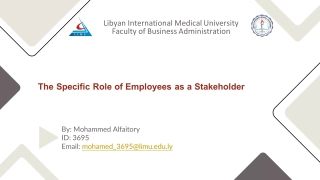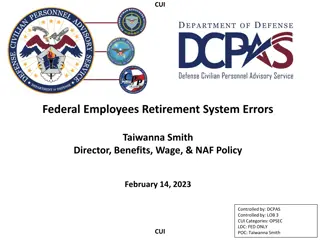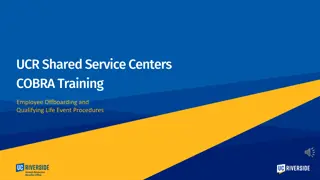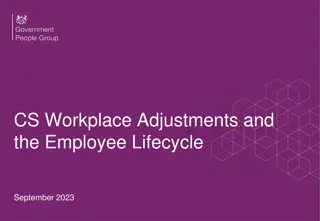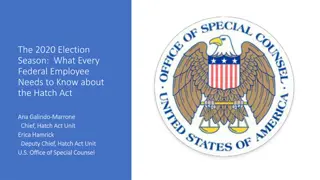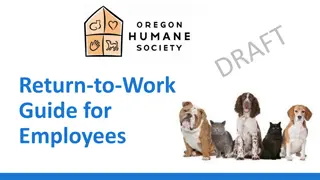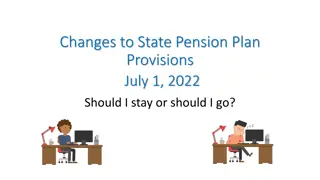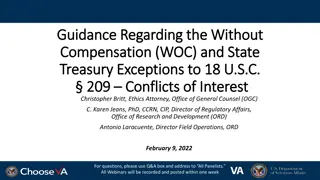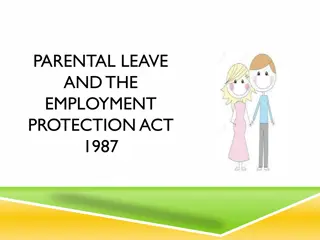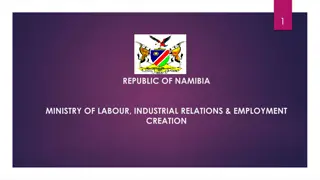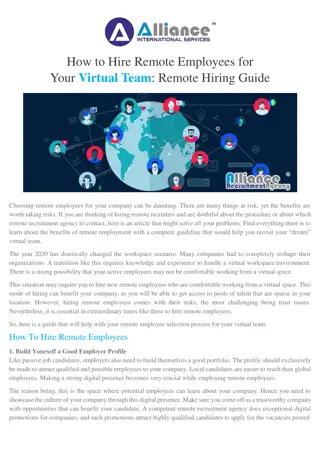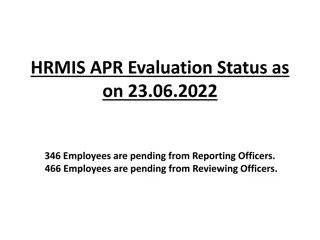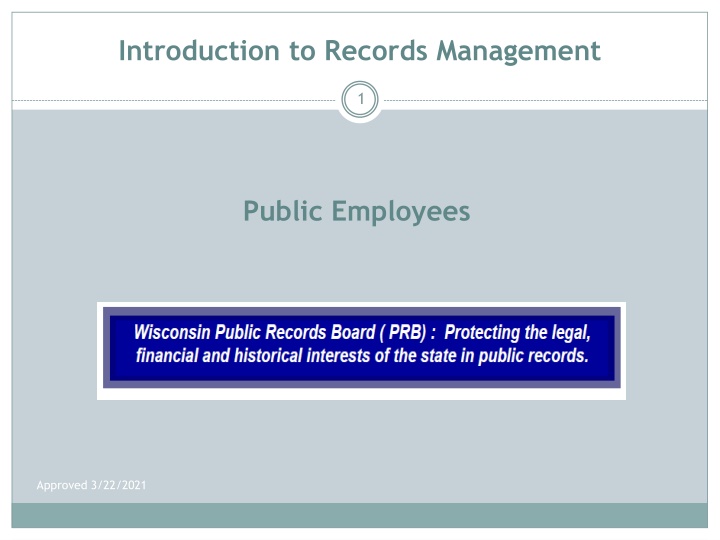
Public Records Management for Public Employees
Explore the importance of public records management for public employees, including defining public records, the lifecycle of a record, responsibilities, and the benefits of proper management. Learn why compliance with legal requirements, transparency, efficiency, risk mitigation, and decision-making are crucial in maintaining public records.
Download Presentation

Please find below an Image/Link to download the presentation.
The content on the website is provided AS IS for your information and personal use only. It may not be sold, licensed, or shared on other websites without obtaining consent from the author. If you encounter any issues during the download, it is possible that the publisher has removed the file from their server.
You are allowed to download the files provided on this website for personal or commercial use, subject to the condition that they are used lawfully. All files are the property of their respective owners.
The content on the website is provided AS IS for your information and personal use only. It may not be sold, licensed, or shared on other websites without obtaining consent from the author.
E N D
Presentation Transcript
Introduction to Records Management 1 Public Employees Approved 3/22/2021
Where Are Public Records Defined? 2 Wis. Stat. 16.61(2)(b) defines public records for the purposes of records retention and disposition Wis. Stat. 19.32(2) defines records for purposes of the records access and disclosure provisions of Wis. Stat. 19.31-19.39 (known as the public records law or the open records law)
What is Records Management? 3 The practice of maintaining records throughout their lifecycle Records management programs manage organizational information to ensure it is useable, cost-effective, timely, accurate, complete and easily accessible Disposing of unneeded and outdated content after the appropriate retention period allows for easier retrieval of records
Why Public Records Management? 5 Comply with applicable legal requirements Promotes transparency in government Documents governmental activities Fulfill obligations efficiently to the public Minimizes legal risk Facilitates decision making Retrieve information faster Promotes best practices in state agency record keeping
What Are Your Public Records Responsibilities? 6 Recognize and manage public records created as part of your job duties Protect and save public records you create and use File paper and electronic documents so they can be readily accessed (use agency file plan if applicable) Safeguard confidential and sensitive information Dispose of information that is not defined as a public record Retain public records for the appropriate length of time Dispose of public records in accordance with an approved Retention Disposition Authorization (RDA) Know where to go for help
What is a Public Record? 7 Recorded information, in any format (including paper, electronic, audio/visual, calendars, maps) created or received by a state employee and/or agency in the transaction of business Information content determines what is a record and not the format in which the information is generated. Records may be textual, pictorial, paper, electronic, audio, video, etc.
What is a Public Record? 8 Created in the course of public business Examples: correspondence and memos (paper and electronic), agreements, studies, reports Received for action Examples: Information or public records requests, tracked correspondence Mandated by statute or regulation Examples: statutorily required programs, administrative records, dockets, equal rights complaints
Where Might Public Records Occur? 9 Information content determines what constitutes a public record and not the format in which the information is generated. Email and voicemail Text, instant messages and chats Social media and Websites Audio, video and online meeting platform recordings Calendars Documents Spreadsheets and databases Personal devices if used for government unit business Maps and blueprints
What Qualities do Public Records Have? 10 Document government unit activities Examples: calendars, meeting minutes, project reports Support financial obligations or legal claims Examples: grants, contracts, litigation case files or audits Communicate agency requirements Examples: guidance documents, policies, procedures
What Public Records Might You Have? 11 Correspondence related to public business Program-related documentation Team, project, committee, or workgroup documentation Activity and project reports Training materials you have presented Work/information requests Operating procedures Calendars and schedules
What Is Not a Public Record under Wis. Stat 16.61(2)(b) for retention purposes? 12 Reference materials and stock copies Examples: vendor catalogs, blank forms Copies Examples: copies of records (paper or electronic) for convenience or reference purposes only Draft or working papers Examples: draft documents without substantive comments, rough notes for personal use (It should be noted that some drafts are needed to support a decision trail or are otherwise required by an RDA) Unsolicited email (internal or external) Examples: reminders received by all staff, listserv
How Do I Manage Public Records? 13 Policies Learn your government unit s records management policies Know which records disposition authorization (RDA) relates to your program records Filing File public records to allow for easy access over time File records in accordance with your government unit s approved filing system to simplify retrieval
How Do I Manage Public Records? 14 Continued People Contact your Records Officer or designated Records Custodian with questions Disposition Dispose of records according to the approved RDA Note: Your government unit may only legally dispose of records as approved by an authorized records schedule
What Is A Retention / Disposition Schedule? 15 Records Disposition Authorizations (RDAs): Mandate how long public records are kept (retention) Group and describe related public records Mandate what happens to public records at the end of that time period (disposition) Are promulgated as policy via a General Records Schedule (GRS) or agency specific RDA
Summary 16 You will create and receive public records You are responsible for managing them This is accomplished through GRSs and RDAs Proper public records management will improve your effectiveness and efficiency There are resources to assist you Records Coordinators Records Custodians Records Officer Legal counsel

